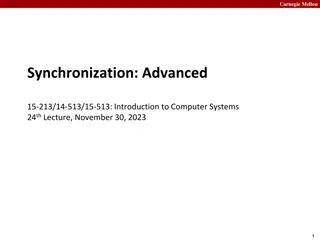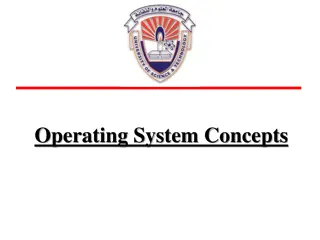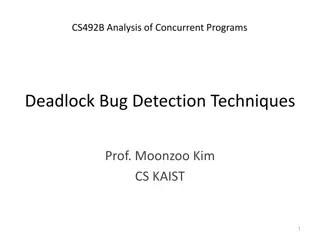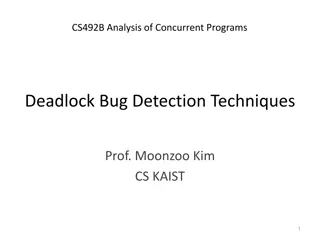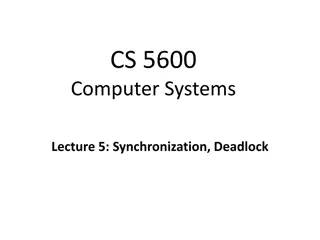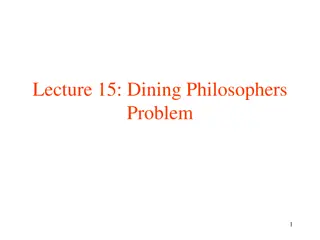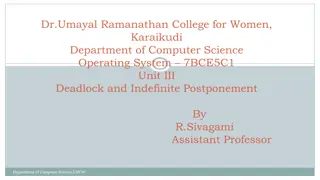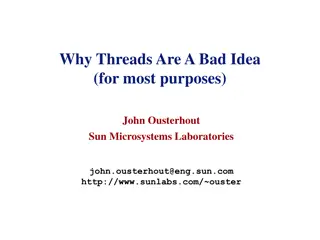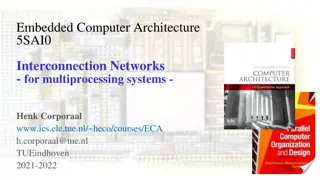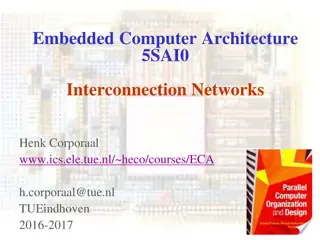Carnegie Mellon Synchronization and Computer Systems Lecture Updates
Carnegie Mellon's recent announcements include lab checkpoints and finals deadlines, as well as the release of an optional lab extension for the Shark File System. The lecture topics cover races, mutual exclusion, deadlock, semaphores, events, queues, reader-writer locks, starvation, and thread-safe
0 views • 43 slides
Deadlocks in Operating Systems
Deadlocks in operating systems occur when processes hold resources and wait for others, leading to a state where none can progress. Processes may hold resources while requesting more, resulting in a standstill known as a deadlock. This deadlock arises from conditions like mutual exclusion, hold and
1 views • 25 slides
Database Deadlocks and Detection
Database Management Systems (DBMS) often face deadlocks, which are situations where transactions are waiting for each other to release data items, leading to a cycle in the wait-for graph. Deadlocks can be detected by analyzing the wait-for graph periodically. If a deadlock is detected, a victim tra
0 views • 10 slides
Deadlock: Conditions, Detection, and Avoidance
Explore strategies for dealing with deadlocks, from detection and recovery to dynamic avoidance. Learn about deadlock avoidance methods like being conservative in resource granting and dive into safe and unsafe states, the Banker's algorithm, and the four conditions for deadlock. Discover how to pre
0 views • 15 slides
Deadlock Avoidance in Operating System Concepts
Deadlock Avoidance is a critical concept in operating system design to prevent system resources from entering a deadlock state. By requiring additional information about resource requests and utilizing algorithms like the banker's algorithm, systems can dynamically allocate resources to avoid circul
1 views • 29 slides
Deadlock in Shareholders Disputes
Shareholders disputes leading to deadlock can be legally complex, potentially resulting in the winding up of a company. The concept of deadlock encompasses functional deadlock, based on the shareholders' inability to cooperate effectively, and irretrievable breakdown of trust and confidence. Differe
3 views • 16 slides
Synchronization Methods in Computing
Exploring synchronization methods like mutual exclusion, deadlock, starvation, and hardware mutex support in computing. Learn about critical sections, preventing race conditions, and the challenges of synchronization. Consider the Test and Set method, its benefits and drawbacks, and the importance o
0 views • 24 slides
Mastering Vendor Negotiations with Bob Fishbein at University of Texas at Dallas
Explore the art of vendor negotiations through the expertise of Bob Fishbein, the AVP of Auxiliary Services at the University of Texas at Dallas. Discover negotiating mindsets, positions of power, strategies for deadlock situations, the impact of cultural differences, and essential do's and don'ts.
1 views • 18 slides
Discovering Techniques for Detecting Deadlock Bugs in Concurrent Programs
This analysis delves into various bug detection techniques for concurrent programs, focusing on deadlock bugs. It explores model checking and testing techniques, discussing their precision, error detection capabilities, and scalability challenges. The prevalence of deadlock bugs in real-world applic
0 views • 35 slides
Techniques for Detecting and Analyzing Deadlock Bugs in Concurrent Programs
Analysis of deadlock bug detection techniques in concurrent programs, highlighting the prevalence of deadlock bugs in real-world applications. The content discusses various bug detection approaches, including model checking and testing techniques, along with the challenges and solutions related to s
0 views • 32 slides
Parallelism in Computer Systems
This content delves into various aspects of parallelism in computer systems, covering topics such as synchronization, deadlock, concurrency vs. parallelism, CPU evolution implications, types of parallelism, Amdahl's Law, and limits of parallelism. It explores the motivations behind parallelism, diff
0 views • 48 slides
Dining Philosophers Problem and Mutual Exclusion Solutions Review
This lecture discusses the Dining Philosophers Problem, a classic synchronization issue in computer science. It covers various solutions for achieving mutual exclusion, including software-based solutions like Peterson's algorithm and hardware-based solutions like Test-and-Set (TSL/XCHG). Additionall
0 views • 17 slides
Deadlock in Operating Systems
Deadlock is a critical issue in operating systems where processes are unable to progress due to unfulfilled dependencies. This content explores deadlock scenarios, including traffic deadlock and resource deadlock, and explains the implications within spooling systems. Common deadlock examples and pr
0 views • 25 slides
Why Threads Are a Bad Idea for Most Purposes - John Ousterhout's Perspective
John Ousterhout, from Sun Microsystems Laboratories, argues that threads are difficult to program and manage due to challenges like synchronization, deadlock, and breaking abstraction. He suggests using events over threads for most purposes. Threads should only be used when true CPU concurrency is n
0 views • 15 slides
Interconnection Networks in Multiprocessing Systems Overview
Explore the intricacies of interconnection networks for multiprocessing systems in Embedded Computer Architecture, covering connecting processors, topologies, routing, deadlock, switching, and performance metrics like bandwidth and latency. Delve into various network types, such as on-chip networks
0 views • 33 slides
Interconnection Networks in Embedded Computer Architecture
Explore the intricacies of interconnection networks in embedded computer architecture, covering topics such as connecting multiple processors, topologies, routing, deadlock, switching, and performance considerations. Learn about parallel computer systems, cache interconnections, network-on-chip, sha
0 views • 43 slides
